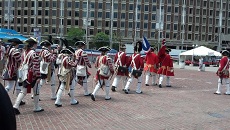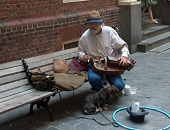Week Four








This week I attended Boston's 31st annual Chowderfest. There were eight different restaurants, each of which had brought their best chowder for people to try and then vote. I had had clam chowder before I came to Boston but had never really been a fan of it. I can now say that I do like clam chowder. It was nice to get to try many different chowders and see which one I liked best. Some had a strong clam taste others had a strong cream flavor. Many were thick in consistency but a couple were water. I really like the ones that had potatoes in it or other vegetables. While in the city I also walked around the harbor and boston commons. While in the commons I fed some squirrels by hand and had a pigeon sit on my hand and eat some crackers.
For my lunch meeting this week we had pizza from Nicks Pizza. This was my first time having pizza up north and though people say it is nothing compared to New York's pizza it was better than anything I have had in North Carolina. I also had the chance to go out to lunch with a friend and we went to Blue Ribbon BBQ. I would have to say this is by far the best southern food I have had in Boston. I had the pulled pork sandwich, baked beans, slaw, and cornbread. Though I have had better barbecue in North Carolina this place was not too bad and had a lot of different sauces all of which were decent.
This week for reading group we read and discusses O notation. We read five post on Godel's lost letters and P=NP, which were: .O.-Abuse, More .O.-Abuse, How to Avoid .O.-Abuse and Bribes, Galactic Algorithms, and Testing Galactic Algorithms. I really enjoyed this reading and found it interesting how you can hide large constants when using O notation.
This week for my research I read Tight bounds on Periodic Cell Configurations in Life by David J. Buckingham and Paul B. Callahan. I found this paper to be one of the few papers that address oscillators in the Game of Life and how to go about creating them. I have not yet found a set algorithm for creating oscillators with period less than 58. There are a couple different ways for creating oscillators that have a large period. From what I can tell to create a low period oscillator you just have to guess random configurations and run them to see if they loop. This has caused a slight bump in my research but I plan to try and create a program to generate random patterns and test them for specific period oscillators. I also plan to look into the known low period oscillators and see if there is any correlation.